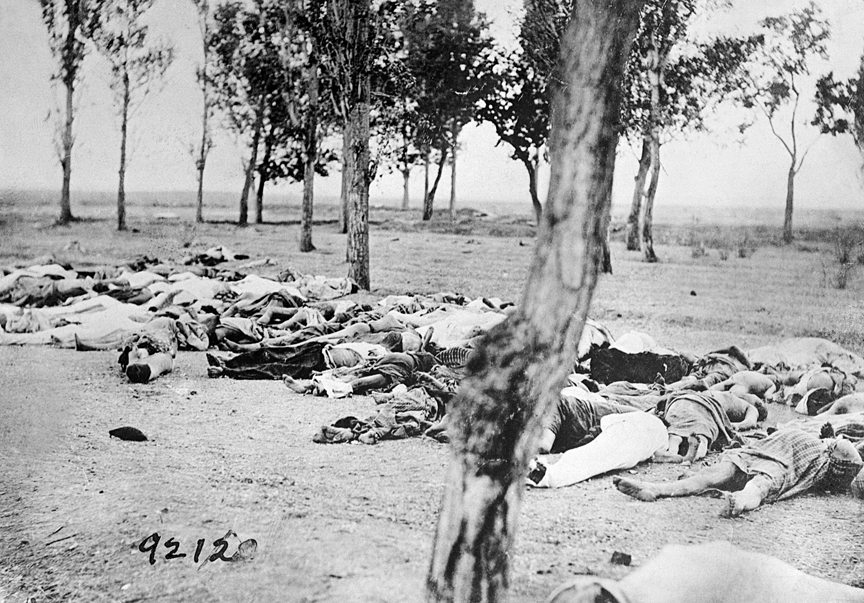A History of World Societies:
Printed Page 889
A History of World Societies Value
Edition: Printed Page 901
The Arab Revolt
Long subject to European pressure, the Ottoman Empire failed to reform and modernize in the late nineteenth century (see “Decline and Reform in the Ottoman Empire” in Chapter 25). Declining international stature and domestic tyranny led to revolutionary activity among idealistic exiles and young army officers who wanted to seize power and save the Ottoman state. These patriots, the so-
For centuries the largely Arab populations of Syria and Iraq had been tied to their Ottoman rulers by their common faith in Islam (though there were Christian Arabs as well). Yet beneath the surface, ethnic and linguistic tensions simmered between Turks and Arabs.
Young Turk actions after 1908 made the embryonic “Arab movement” a reality. The majority of Young Turks promoted a narrow Turkish nationalism. They further centralized the Ottoman Empire and extended the sway of Turkish language and culture. In 1909 the Turkish government brutally slaughtered thousands of Armenian Christians, a prelude to the wholesale massacre of more than a million Armenians during the First World War. Meanwhile, Arab discontent grew.

During World War I the Turks freely aligned themselves with the Central Powers — Germany and Austria-
Arab bitterness was partly directed at secret wartime treaties between Britain and France to divide and rule the old Ottoman Empire. In the 1916 Sykes-
A related source of Arab frustration was Britain’s wartime commitment to a Jewish homeland in Palestine. The Balfour Declaration of November 1917, made by the British foreign secretary Arthur Balfour, declared:
His Majesty’s Government views with favour the establishment in Palestine of a national home for the Jewish People, and will use their best endeavors to facilitate the achievement of this object, it being clearly understood that nothing shall be done which may prejudice the civil and religious rights of existing non-
As a careful reading reveals, the Balfour Declaration made contradictory promises to European Jews and Middle Eastern Arabs. The last phrase in the final sentence is a guarantee that Jews in England or France, for example, would not automatically lose their citizenship and rights in those countries if there were an independent Jewish state.
Some British Cabinet members believed the Balfour Declaration would appeal to German, Austrian, and American Jews and thus help the British war effort. Others sincerely supported the Zionist vision of a Jewish homeland (see “Arab-Jewish Tensions in Palestine”), but also believed that Jews living in this homeland would be grateful to Britain and thus help maintain British control of the Suez Canal.
In 1914 Jews made up about 11 percent of the predominantly Arab population in the Ottoman territory that became, under British control, Palestine. The “national home for the Jewish People” mentioned in the Balfour Declaration implied to the Arabs — and to the Zionist Jews as well — some kind of Jewish state that would be incompatible with majority rule. Moreover, a state founded on religious and ethnic exclusivity was out of keeping with both Islamic and Ottoman tradition, which had historically been more tolerant of religious diversity and minorities than had the Christian monarchs and nation-
After Faisal bin Hussein’s failed efforts at the Paris Peace Conference to secure Arab independence (see “The Paris Peace Treaties” in Chapter 28), Arab nationalists met in Damascus as the General Syrian Congress in 1919 and unsuccessfully called again for political independence. (See “Listening to the Past: Resolution of the General Syrian Congress at Damascus.”) Ignoring Arab opposition, the British mandate in Palestine formally incorporated the Balfour Declaration and its commitment to a Jewish national home. In March 1920 Faisal’s followers met again as the Syrian National Congress and proclaimed Syria independent, with Faisal as king. A similar congress declared Iraq an independent kingdom.
Western reaction to events in Syria and Iraq was swift and decisive. A French army stationed in Lebanon attacked Syria, taking Damascus in July 1920. Faisal fled, and the French took over. Meanwhile, the British put down an uprising in Iraq with bloody fighting and established effective control there. Western imperialism appeared to have replaced Turkish rule in the Middle East (see Map 29.1).